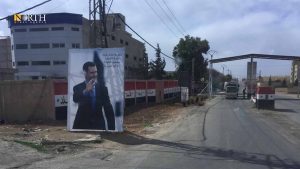DARAA, Syria (North Press) – After four years of waiting, family of Muhammad Ammar al-Zo’bi, from Daraa in southern Syria, was shocked after receiving the body of its missing son, tortured to death in the prisons of the Syrian government.
Daraa, known as the birthplace of the Syrian revolution, is home to some 40,000 people and was an opposition stronghold until 2018.
The family tried to pay large sums of money to officers in the government forces in exchange for al-Zo’bi’s release, but all in vain.
The 24-year-old young man was arrested at one of the military checkpoints of the government forces on the Damascus-Daraa highway, after he went through the government’s settlement process mediated by Russia.
The young man, according to the source, had never joined any of the opposition’s military formations.
During April, the government forces handed over the bodies of two civilians who were killed under torture in their detention facilities, as al-Zo’bi was one of them, in tandem with the issuance of a presidential decree criminalizing those who torture detainees.
The Syrian government passed an anti-torture law, on March 30, 2022, criminalizing torture and assigning a penalty of at least three years’ imprisonment, and up to the death penalty where the torture results in death or involves rape.
Dead letters
Activists in Daraa believe that the decisions issued by the government regarding the detainees are nothing but dead letters and are not be implemented.
Like al-Zo’bi, the relatives of Muhammad Ghazi Abu Rukba received the body of their 34-year-old son, four years after his arrest in Saydnaya prison in Damascus, with signs of torture in the head and chest.
Abu Rukba, who hails from the city of Nawa in the western countryside of Daraa, had defected from the government forces at the beginning of the Syrian protests in Daraa governorate.
After the settlement agreement was implemented in 2018, he surrendered with the aim of benefiting from the amnesty issued against the dissidents, to be arrested instead of being returned to military service, local sources told North Press.
His family tried to pay an amount of 40 million SYP as a bribe to government officers to release Abu Rukba, but they were shocked after receiving his body to be buried in the city cemetery.
The issue of detainees in government forces’ prisons is one of the most prominent outstanding issues in Daraa governorate after the implementation of the terms of the 2018 settlement agreement, which stipulates in one of its clauses the disclosure of the fate of the detainees and the release of the rest with a Russian mediation.
But this clause of the agreement has not been implemented, and government forces officers are evading its implementation by creating arguments in every meeting that takes place between them and members of the Central Committee in Daraa, according to activists.
The central committee in Daraa consists of anti-government activists, lawyers, sheikhs and former opposition leaders who engaged in Russian-brokered reconciliations with the Syrian government in 2018.
The government forces have controlled the Daraa and Quneitra governorates in the south since July 2018, through settlement agreements imposed by the Russians on the opposition groups.
In the prisons
Young men make up the bulk of the detainees inside government prisons since the beginning of the protests in 2011.
Some of them do not have any activities, but the unnatural torture they are subjected to, often forces them to confess to actions they have never done or even heard of, in order to escape the torture, according to former detainees in government prisons North Press interviewed.
Syria has been ravaged by civil war since early 2011.
Shamil Abu al-Ayyun, a pseudonym for one of the detainees who spent five years in several prisons of the government forces, said that he could not imagine how difficult the methods of torture were.
He further explained that there were dozens of methods used in torture, most notably the use of electric wires on the body of the detainee, which leads to abnormal trembling in the body, and in many cases the detainee fainted due to electric shocks, forcing him to confess to anything he had never done.
Cunning and deceit
Radi al-Samish, 55, a resident of Daraa who had been detained for three years, told North Press that the psychological torture that he had been subjected to in Saydnaya prison was no less than the physical one.
The worst form of torture is to stand before a member younger than your son and see him revile you while “you are handcuffed, and not able to do anything.”
The government follows a deceitful policy by issuing these anti-torture decrees aiming to absorb the outrage of people who haven’t stopped asking for freeing detainees, according to Suleiman al-Omar, a pseudonym for a Daraa-based activist.
The activist believes that the detainees are not able to sustain further pressure after all these years of torture at the hands of the intelligence.
Issuing a decree that incriminates those who tortured detainees and imprison them for eight years, “is just a step by the government to lift accountability upon itself for those who were tortured to death in its prisons,” the activist said.

